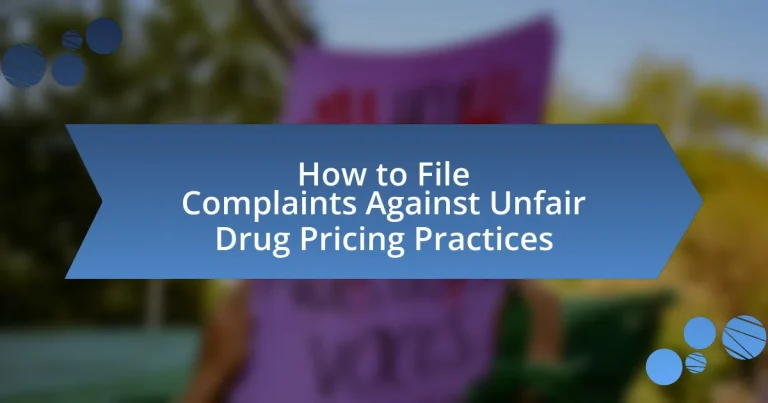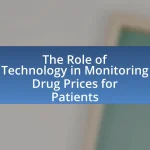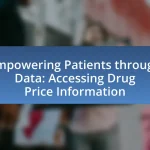Unfair drug pricing practices involve unethical pricing strategies by pharmaceutical companies that lead to exorbitant medication costs, often without justification. These practices, such as price gouging and complex pricing structures, significantly impact consumers by making essential medications unaffordable, resulting in difficult choices between health and financial stability. The article outlines the common examples of these practices, their effects on consumers, and the legal frameworks in place to address them. It also provides guidance on how individuals can file complaints against unfair pricing, including necessary documentation and resources available for support.
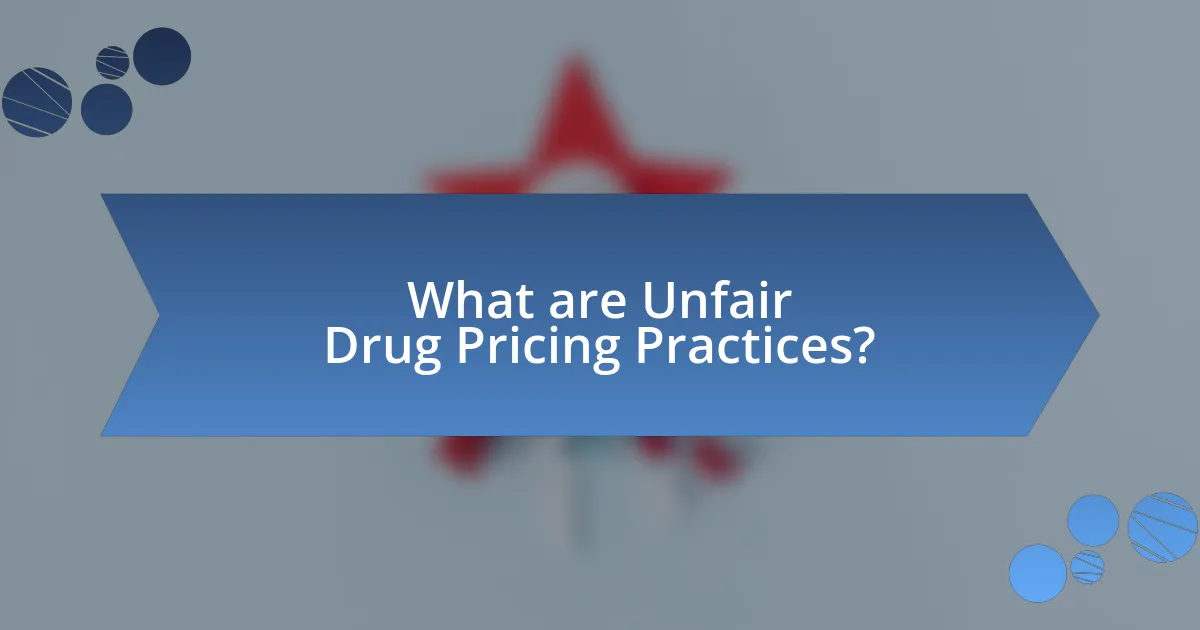
What are Unfair Drug Pricing Practices?
Unfair drug pricing practices refer to unethical or exploitative pricing strategies employed by pharmaceutical companies that result in excessively high costs for medications, often without justification based on research and development expenses. These practices can include price gouging, where companies significantly increase prices for essential drugs, particularly during shortages or emergencies, and the use of complex pricing structures that obscure true costs, making it difficult for consumers and healthcare providers to understand pricing. For instance, a study by the House of Representatives in 2019 highlighted that the price of insulin had tripled over a decade, despite no significant changes in production costs, illustrating the impact of unfair pricing on patients.
How do unfair drug pricing practices impact consumers?
Unfair drug pricing practices significantly burden consumers by increasing their out-of-pocket expenses for necessary medications. These practices often lead to inflated prices that exceed the actual production and distribution costs, making essential drugs unaffordable for many individuals. For instance, a report from the House of Representatives in 2019 indicated that nearly one in four Americans reported not filling a prescription due to high costs, illustrating the direct impact of unfair pricing on access to healthcare. Additionally, consumers may face financial strain, leading to difficult choices between medication and other essential needs, which can ultimately compromise their health outcomes.
What are the common examples of unfair drug pricing practices?
Common examples of unfair drug pricing practices include price gouging, where pharmaceutical companies significantly increase the price of essential medications, often during emergencies. Another example is the practice of “evergreening,” where companies make minor modifications to existing drugs to extend patent protections and delay generic competition, keeping prices high. Additionally, the use of complex pricing structures, such as hidden fees and rebates that obscure the true cost of drugs, contributes to unfair pricing. These practices have been documented in various reports, including a 2019 study by the House of Representatives Ways and Means Committee, which highlighted the dramatic price increases of certain life-saving medications, illustrating the impact of these unfair practices on patients and healthcare systems.
Why do these practices occur in the pharmaceutical industry?
Unfair drug pricing practices occur in the pharmaceutical industry primarily due to profit maximization strategies employed by companies. These companies often prioritize financial gain over patient access, leading to inflated prices for medications. For instance, a 2020 study published in the Journal of the American Medical Association found that the prices of brand-name drugs increased by an average of 9.5% annually, significantly outpacing inflation. This trend is driven by factors such as limited competition, patent protections, and the high costs associated with research and development, which companies use to justify their pricing strategies.
What legal frameworks exist to address unfair drug pricing?
Legal frameworks that exist to address unfair drug pricing include the Affordable Care Act, which mandates transparency in drug pricing, and the Drug Pricing Competition and Patent Term Restoration Act, also known as the Hatch-Waxman Act, which facilitates the entry of generic drugs to promote competition. Additionally, state laws in various jurisdictions allow for the regulation of drug prices and the establishment of price caps on certain medications. These frameworks aim to enhance market competition and protect consumers from exorbitant pricing practices.
How do federal laws regulate drug pricing practices?
Federal laws regulate drug pricing practices primarily through the Medicare Prescription Drug, Improvement, and Modernization Act of 2003 and the Affordable Care Act of 2010. These laws establish frameworks that require transparency in pricing, prohibit certain anti-competitive practices, and mandate that drug manufacturers provide discounts to federal programs. For instance, the Medicaid Drug Rebate Program requires manufacturers to pay rebates to state Medicaid programs, ensuring that drug prices remain affordable for low-income patients. Additionally, the Drug Price Competition and Patent Term Restoration Act encourages the entry of generic drugs into the market, which helps lower prices by increasing competition.
What role do state laws play in combating unfair pricing?
State laws play a crucial role in combating unfair pricing by establishing regulations that protect consumers from price gouging and deceptive pricing practices. These laws empower state authorities to investigate pricing discrepancies and impose penalties on businesses that engage in unfair pricing tactics. For instance, many states have enacted laws that specifically target price gouging during emergencies, allowing for swift action against companies that significantly raise prices on essential goods, including medications. This legal framework not only deters unfair pricing but also provides consumers with a mechanism to report violations, thereby enhancing accountability in the marketplace.
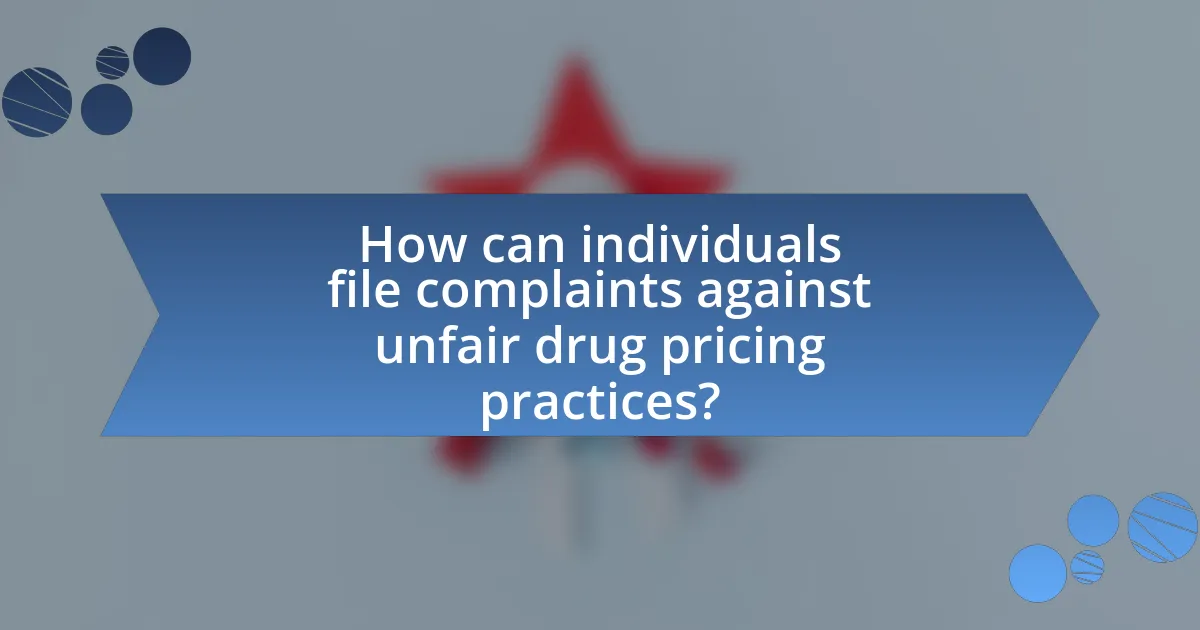
How can individuals file complaints against unfair drug pricing practices?
Individuals can file complaints against unfair drug pricing practices by contacting the appropriate regulatory bodies, such as the Federal Trade Commission (FTC) or state attorneys general. These organizations investigate complaints related to unfair or deceptive practices in the pharmaceutical industry. To file a complaint, individuals should provide detailed information about the pricing issue, including the name of the drug, the price discrepancy, and any relevant documentation, such as receipts or advertisements. The FTC has a dedicated online complaint form that can be used for this purpose, ensuring that the complaint is formally recorded and reviewed. Additionally, state attorneys general often have their own processes for handling such complaints, which can vary by state.
What steps should be taken to file a complaint?
To file a complaint against unfair drug pricing practices, first, gather all relevant information, including details about the drug, pricing discrepancies, and any supporting documentation. Next, identify the appropriate regulatory body or organization to address your complaint, such as the Federal Trade Commission or state pharmacy boards. Then, submit your complaint through the designated channels, which may include online forms, email, or postal mail, ensuring that you provide all necessary details and evidence. Finally, follow up on your complaint to confirm receipt and inquire about the status of your case.
How do you gather evidence for your complaint?
To gather evidence for your complaint regarding unfair drug pricing practices, collect relevant documentation such as receipts, invoices, and price comparisons. These documents serve as concrete proof of the pricing discrepancies you are experiencing. Additionally, gather any correspondence with the pharmacy or drug manufacturer that highlights your concerns, as this can demonstrate your attempts to resolve the issue directly. Furthermore, research and compile data on average drug prices from reputable sources, such as the Centers for Medicare & Medicaid Services, to substantiate your claims. This comprehensive approach ensures that your complaint is well-supported and credible.
What information is necessary to include in your complaint?
To file a complaint against unfair drug pricing practices, include the following information: your contact details, a clear description of the issue, the name of the drug and its manufacturer, the specific pricing practices you believe are unfair, and any relevant documentation such as receipts or correspondence. This information is essential as it provides a comprehensive overview of your complaint, allowing the reviewing authority to understand the context and specifics of the situation. Including detailed evidence, such as pricing comparisons or statements from healthcare providers, strengthens your case and supports your claims of unfair practices.
Where can complaints be submitted?
Complaints regarding unfair drug pricing practices can be submitted to the Federal Trade Commission (FTC) through their online complaint form. The FTC is responsible for protecting consumers and promoting competition, making it a suitable entity for addressing such issues. Additionally, individuals can report complaints to their state attorney general’s office, which can investigate and take action against unfair pricing practices within their jurisdiction.
What federal agencies handle drug pricing complaints?
The federal agencies that handle drug pricing complaints include the Department of Health and Human Services (HHS), the Food and Drug Administration (FDA), and the Federal Trade Commission (FTC). HHS oversees various health-related issues, including drug pricing policies, while the FDA regulates the approval and marketing of pharmaceuticals. The FTC addresses anti-competitive practices in the pharmaceutical industry, which can impact drug pricing. These agencies collectively provide mechanisms for consumers and healthcare providers to report and address concerns regarding unfair drug pricing practices.
How can state agencies assist in filing complaints?
State agencies can assist in filing complaints by providing clear guidelines and resources for consumers to report unfair drug pricing practices. These agencies often have dedicated hotlines, online portals, and forms specifically designed for complaint submission, ensuring that individuals can easily access the necessary tools to voice their concerns. For instance, the National Association of Attorneys General highlights that many state attorneys general have consumer protection divisions that actively investigate complaints related to drug pricing, thereby reinforcing the validity of the complaint process.
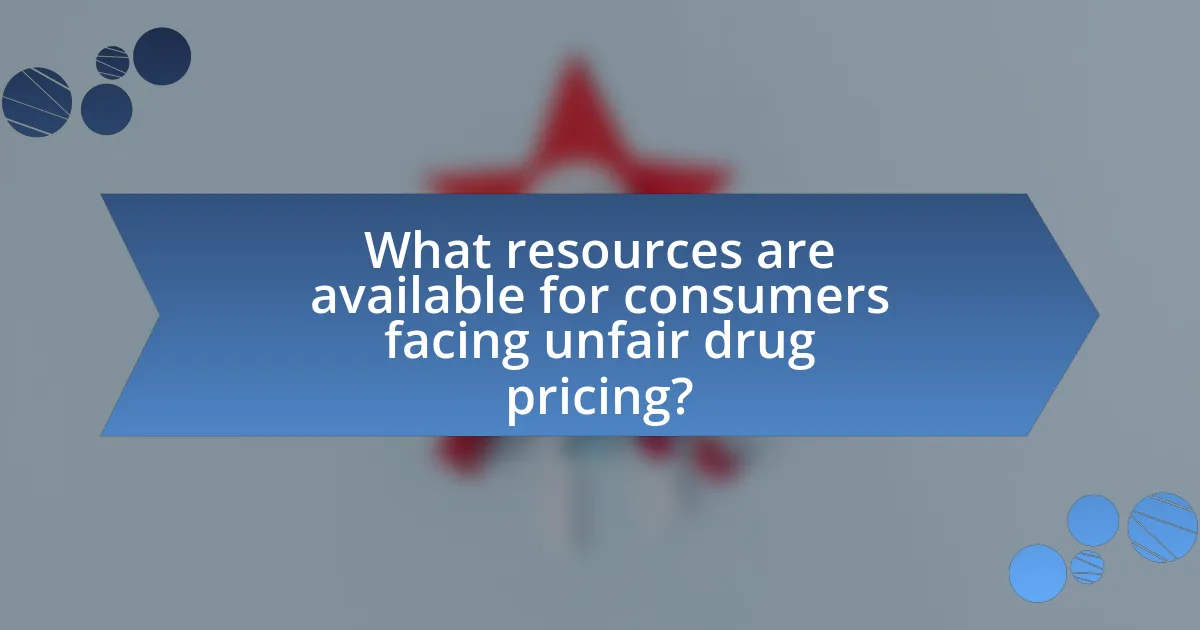
What resources are available for consumers facing unfair drug pricing?
Consumers facing unfair drug pricing can access several resources to address their concerns. These resources include state and federal consumer protection agencies, such as the Federal Trade Commission (FTC), which investigates unfair business practices, and state attorney general offices that handle consumer complaints. Additionally, organizations like the National Consumers League provide advocacy and support for consumers dealing with high drug prices. The Drug Pricing Dashboard by the Centers for Medicare & Medicaid Services offers transparency on drug pricing, helping consumers make informed decisions. Furthermore, online platforms like GoodRx allow consumers to compare prices and find discounts on medications. These resources empower consumers to take action against unfair pricing practices effectively.
How can advocacy groups assist consumers?
Advocacy groups assist consumers by providing resources, support, and representation in addressing unfair drug pricing practices. These organizations often conduct research to highlight pricing discrepancies, educate consumers about their rights, and offer guidance on how to file complaints against pharmaceutical companies. For instance, groups like the National Consumers League have been instrumental in raising awareness about drug pricing issues and advocating for policy changes that benefit consumers. Additionally, advocacy groups may facilitate communication between consumers and regulatory bodies, ensuring that consumer voices are heard in discussions about drug pricing regulations.
What are some notable organizations focused on drug pricing issues?
Notable organizations focused on drug pricing issues include the Institute for Clinical and Economic Review (ICER), the National Academy for State Health Policy (NASHP), and the Pharmaceutical Research and Manufacturers of America (PhRMA). ICER evaluates the value of drugs and provides evidence-based assessments to inform pricing discussions. NASHP works on state-level policies to improve healthcare affordability, including drug pricing reforms. PhRMA represents the pharmaceutical industry and advocates for policies that support innovation while addressing pricing concerns. These organizations play significant roles in shaping the dialogue around drug pricing and influencing policy decisions.
How can these organizations help in filing complaints?
Organizations can assist in filing complaints by providing guidance on the complaint process, offering templates for documentation, and facilitating communication with regulatory bodies. For instance, consumer advocacy groups often have resources that outline the steps necessary to file a complaint regarding unfair drug pricing, including identifying the appropriate agencies to contact, such as the Federal Trade Commission or state health departments. Additionally, these organizations may offer support in gathering evidence and submitting complaints, which can enhance the likelihood of a successful resolution.
What tips can help consumers navigate the complaint process effectively?
To navigate the complaint process effectively, consumers should document all relevant information, including dates, names, and details of the issue. This thorough documentation serves as evidence and helps clarify the situation when filing a complaint. Additionally, consumers should familiarize themselves with the specific complaint procedures of the organization or regulatory body they are addressing, as each may have unique requirements. Research indicates that complaints submitted with clear, concise information are more likely to receive prompt attention and resolution. Furthermore, following up on the complaint after submission can ensure that it is being processed and can lead to quicker outcomes.
How can consumers stay informed about their rights regarding drug pricing?
Consumers can stay informed about their rights regarding drug pricing by accessing resources provided by government agencies, non-profit organizations, and healthcare advocacy groups. The U.S. Department of Health and Human Services offers information on drug pricing rights through its website, while organizations like the National Patient Advocate Foundation provide educational materials and support. Additionally, state pharmacy boards often publish guidelines and consumer rights information related to drug pricing. These resources ensure that consumers are aware of their rights, including the ability to report unfair pricing practices and seek assistance.
What best practices should be followed when filing a complaint?
When filing a complaint against unfair drug pricing practices, it is essential to clearly document the issue, including specific details such as the drug name, pricing discrepancies, and any relevant communications. This documentation serves as a foundation for your complaint and ensures that all pertinent information is available for review. Additionally, it is advisable to identify the appropriate regulatory body or organization to address your complaint, such as the Federal Trade Commission or state pharmacy boards, as they have established procedures for handling such issues. Following these procedures increases the likelihood of a thorough investigation and resolution. Furthermore, submitting your complaint in writing, while retaining copies for your records, provides a formal record of your grievance and can facilitate follow-up communication.
